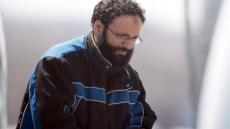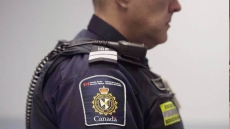OTTAWA — Federal officials have told Prime Minister Justin Trudeau that a truce between Israel and the militant group Hamas would be in both of their interests.
The advice is contained in a memo written for the incoming prime minister, and represents for some analysts a noticeable shift in policy towards the Middle East from nearly 10 years of Conservative rule under Stephen Harper.
The contents of the memo, obtained by The Canadian Press under the Access to Information Act, are timely: Israeli warplanes bombed the Gaza Strip today, the first violent flare-up there since the 50-day summer war between Israel and Hamas in 2014.
Canada has formally listed Hamas, which controls Gaza, as a terrorist group.
Israel, meanwhile, has denied sporadic reports that it's been talking with Hamas.
The memo to Trudeau lays out the geopolitical stakes in the ongoing Middle East crisis between Israel and the Palestinians, but does not specify any role for Canada.
It says there are "persistent reports of indirect talks between Israel and Hamas aimed at negotiating an extended ceasefire." It notes that the Palestinian Authority, which controls the West Bank, is "concerned that it is being shut out of the process, while the government of Israel has denied reports that such negotiations are underway."
The memo reminds the prime minister that the territory has been heavily damaged in wars since then.
"After three wars with Israel and limited reconstruction on Gaza's infrastructure, a truce between Israel and Hamas would be in their respective interests."
In addition to killing 2,200 Palestinians, most of them civilians, and 73 Israelis, most soldiers, an estimated 100,000 Gazans were left homeless after the third war in 2014. Harper blamed the death and destruction of Gaza solely on Hamas, condemning it for rocket attacks on Israel.
The memo shows the incoming Trudeau government coming to terms with a "geopolitically significant" development in the Palestinian-Israeli conflict, said Kamran Bokhari of the University of Ottawa's Security and Policy Institute.
"It's a pretty sharp contrast with the position of the Harper government, which was very much anti-Hamas and very much pro-Israel," said Bokhari, who is also a fellow with George Washington University's Program on Extremism at the Center for Cyber and Homeland Security.
The memo reflects the "ideological divide" as well as a geographical one that characterizes the current state of the Palestinian people, he said; they are separated in two unconnected territories — the West Bank and Gaza — and controlled by two separate entities — the Palestinian Authority and Hamas.
An Israeli official, who was authorized to speak only on condition that they not be named, said Hamas is a terrorist organization and its main purpose is to destroy the state of Israel.
"Negotiating with it or dealing with it is not something that is plausible or beneficial," the official said.

Despite that, the official made clear that Israel will do whatever it takes to retrieve the bodies of fallen soldiers in Gaza to give them proper burials, and that includes holding "indirect" talks with Hamas through third parties.
The official cited the release of Israeli Defence Force soldier Gilad Shalit, who was held by Hamas for five years before he was freed in exchange for Palestinian prisoners in a deal brokered by Egypt.
The memo was provided by the Privy Council Office in preparation for the incoming Liberal government.
Since his Oct. 19 election victory, Trudeau has affirmed Canada's ongoing support of Israel, but his office has said the tone of relationship might change — a reference to the boisterous support of the previous Conservative government.
Rafael Barak, Israel's ambassador to Canada, has said Trudeau has a record of unwavering support for Israel, and his country does not expect that to change. Prime Minister Benjamin Netanyahu invited Trudeau to visit Israel in what was described as a warm telephone call after his election win.
The memo to Trudeau affirms Canada's historic support of Israel.
"Support for Israel and its right to live in peace and security with its neighbours has been Canadian policy since 1948," it says.
"Canada is opposed to unilateral Palestinian initiatives in international fora such as the failed December 2014 UN Security Council resolution and the purported Palestinian accession to the Rome Statute of the International Criminal Court."
Israeli officials say they see that latter policy as key to Canada's support. They say that Canada has demonstrated its support of Israel by speaking out on behalf of the country when international bodies have taken steps to criticize it.




